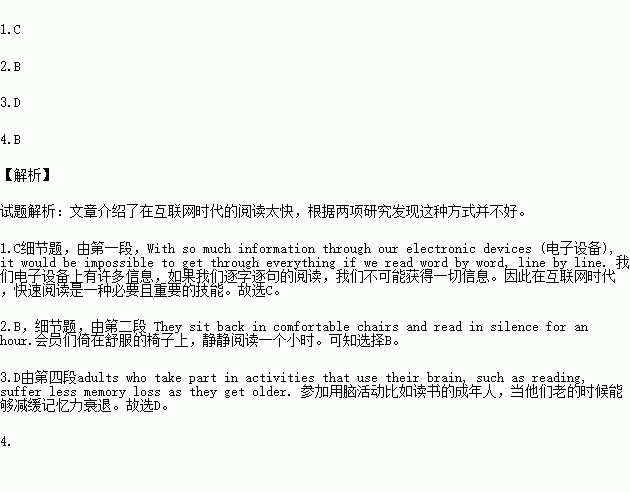题目内容
In the Internet age, speed reading is a necessary and important skill. We skim over articles and e-mails to try to get key words and the main idea of the text. With so much information through our electronic devices (电子设备), it would be impossible to get through everything if we read word by word, line by line. However, a new trend calls on people to enjoy reading slowly.
A recent story from The Wall Street Journal reported on a book club in Wellington, New Zealand, where members meet in a café and turn off their smartphones. They sit back in comfortable chairs and read in silence for an hour.
Unlike typical book clubs, the point of the slow reading club isn’t to exchange ideas about certain books, but to get away from electronic devices and read in a quiet, relaxed environment. According to the story, the Wellington book club is just one example of a movement started by book lovers who miss the traditional way of reading.
Traditional readers, like Maura Kelly, say a regular reading habit sharpens the mind, improves concentration, reduces stress levels and deepens the ability to understand others. Some of these benefits have been backed up by science. For example, a study of 300 elderly people published by the journal Neurology last year showed that adults who take part in activities that use their brain, such as reading, suffer less memory loss as they get older. Another study published last year in Science showed that reading novels helps people understand others’ mental states and beliefs — a key skill in building relationships.
Yet technology has made us less careful readers. Computer and phone screens have changed our reading patterns from the top-to-bottom, left-to-right reading order we traditionally used, to a wild skimming pattern as we hunt for important words and information. Reading text online that has many links to other web pages also leads to weaker comprehension than reading plain text. The Internet may have made us stupider, says British journalist Patrick Kingsley, only half joking. Because of the Internet, he says we have become very good at collecting a wide range of factual tidbits (花边新闻), but we are also gradually forgetting how to sit back, think and connect all these facts with each other.
1.Speed reading is a necessary and important skill in the Internet age because people ______.
A. no longer read word by word, line by line
B. have to get the meaning faster
C. have much more information to read
D. must use their smartphones more frequently
2.Members of the Wellington book club are expected to ______.
A. make coffee for the other members
B. read peacefully for an hour
C. regularly exchange ideas about books
D. turn off their smartphones for sleeping
3.According to the Neurology study, who is most likely to suffer memory loss?
A. A 79-year-old woman who reads regularly.
B. A 17-year-old middle school student who seldom reads.
C. A healthy 24-year-old university graduate who often plays games.
D. A 65-year-old man who rarely reads.
4.The last paragraph is written to ______.
A. explain the secrets of others’ minds
B. describe the problems caused by electronic reading
C. call on people to read more about science
D. encourage people to read as slowly as possible


 ),并在其下面写出该加的词。
),并在其下面写出该加的词。